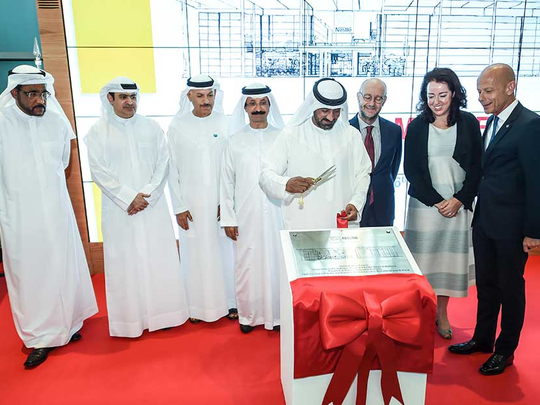
DUBAI: Nestle’s Dh530 million Al Maha factory was officially opened in Dubai South on Tuesday by Shaikh Ahmad Bin Saeed Al Maktoum, President of Dubai Aviation Authority, Chairman of Dubai Airports, and Chairman and Chief Executive of Emirates Airline and Group.
The factory — Nestle’s third in the UAE and 18th in the Middle East — will produce up to 22,000 tonnes annually of Nescafe coffee products, and 20,000 Maggi soups and mixes. The factory is halal-certified by the Emirates Authority for Standardisation and Metrology (Esma).
The 30,000 square metre factory is designed to produce zero waste. It uses LED lighting and is insulated to reduce electricity demands.
The factory employs 340 people directly. Justin Wilshaw, Senior Vice-President at Dubai South, said its presence has created more than 1,000 jobs and helped established Dubai South as a food and perishables hub for the region.
Yves Manghardt, Chairman and CEO of Nestle Middle East, said the UAE’s stability was its primary attraction for investment.
“We’ve been in the region for more than 80 years,” he said, adding, “We have always found the UAE and Dubai in particular to be stable and a very positive business environment. We have established strong relationships with the authorities.”
The products from the factory will be exported around the Middle East, he said, adding in a private interview that cross border regulations posed the most significant challenge to the company’s business.
“We cover 13 countries, and we have 13 different regulatory standards. Even within the GCC for some products you have different standards depending on the country. So we really would very much support and alignment of regulatory standards across the region — even, if possible, across the globe. It really makes everybody’s life easier.
“To have different standards from country to another could even lead us to have specific SKUs, or products, just for one country, which at the end of the day is also affecting the overall economical viability of some products.”
He said Nestle relied heavily on European and US standards.
But Europe was facing uncertainty over the effects of Brexit, said Marco Settembri, Executive Vice-President of Nestle SA and Head of Zone for Europe, the Middle East and North Africa.
While he denied Nestle would scale back investments in the UK, he said, “We need certainty about what will happen in the future. Nestle, we are about free trade, the free movement of goods, the free movement of people, and clear regulation. We need to know if this will remain.”












